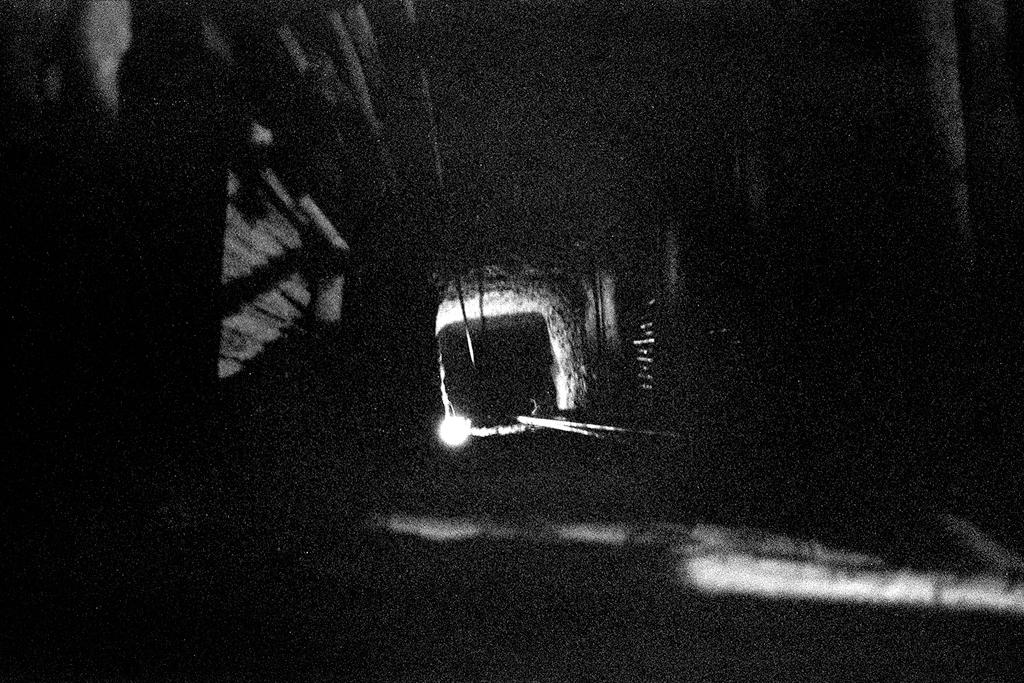‘Gun disease’ afflicts Myanmar’s gold miners
An active mine shaft at night. Miners work around the clock to meet increasing demand for domestic and international exportation.
MANDALAY, Myanmar — In the gold mines of Sinktu and Thabait Kyin, in the Mandalay division of Myanmar, gold mining is famous. More than 30 gold mines are active here, but the scene doesn't look much like wealth. Half-naked men with rusty pneumatic drills and homemade dynamite are lowered 500 feet on fraying ropes into holes in the ground. Covering their faces with rags, they drill gold ore from the stone.
“We break the rocks with high pressured guns, but breathe the small particles that come from breaking the stone. We contract lung infections that we call 'gun disease,'" says Wat Tay, 35, a gold miner from Sintku Township.
Through the night groups of men squat above mine shafts, ankle deep in muddy puddles, waiting to haul out ore or winch up their friends. After working in the mines for a decade, workers' lungs begin to give out, they say. Hidden in bamboo huts, attached to oxygen, they wheeze out their last days.
“The owners of gold pits don't care about the health issues of the miners, so the health problems are increasing. They don't pay for safety protection for us, so we make do ourselves, like putting some clothes over our mouths, or buying cheap masks to reduce the dust we breathe in,” says Wat Tay.
Until 2011, and the fall of the military junta, all mines and mining activity in Myanmar was owned by the government. Since then, mines such as Sinktu, which is seven square miles in area and employs more than 500 workers, were sold off to private owners.
Now the government's Ministry of Mines acts as a non-equity partner with private mine owners, requiring a mandatory 30 percent share of all exports, profits and royalties earned, enforced under the 1994 Mines Law. Currently talks are being held to overhaul this law, as it's dissuading foreign investment.
Myanmar's gold production and exports are very low in comparison to global outputs. Before 2011, the country produced 100 kg of processed gold per year. Since then, output has doubled due to softening government sanctions and international demand, but it's still a long way behind China's more than 360,000 kg per year.
But Myanmar's huge mineral deposits are seen as key to export-driven growth. In recent months the price of gold has slowly risen in Myanmar, possibly linked to the decline of the dollar, as an opportunistic public sells their jewelry at high prices and are ready to buy back if prices drop.
Forums are being held in capital cities by the Myanmar government, mine owners, and the Ministry of Mines to persuade foreign investment from corporate companies for industrial technology. The goal is to reduce Myanmar's poverty rate from 26 percent to 16 percent by 2015, by exporting the country's gold reserves. However, added demand for export means an increased need for manpower, working hours and medical support.
Although domestic labor laws have been passed and the International Labor Organization has lifted restrictions on trade and investment in Myanmar, workers here live a life of risk.
Miners are given one or two bananas after a shift in the tunnels, to help with nutrition, but say no respiration equipment is provided by the mine owners. Miners don't have the money to invest in equipment themselves.
And although cases are frequent, perhaps inevitable, there is no health care system for the miners and no formal diagnosis for “gun disease.”
Instead, the miners who fall ill are given a tank of oxygen and left to fend for themselves, too weak to seek other employment or to leave their huts.
“I can't breathe well. If I breathe my abdominal muscles are tight and it hurts also in my back. I pain feel when I breathe. Twice they've given me pills for tuberculosis, but this medicine has no effect for me,” says Kwin Tone Sel, 42. He used to mine in Sintku Township, before his lung disease prevented him from leaving his bed.
Our coverage reaches millions each week, but only a small fraction of listeners contribute to sustain our program. We still need 224 more people to donate $100 or $10/monthly to unlock our $67,000 match. Will you help us get there today?
